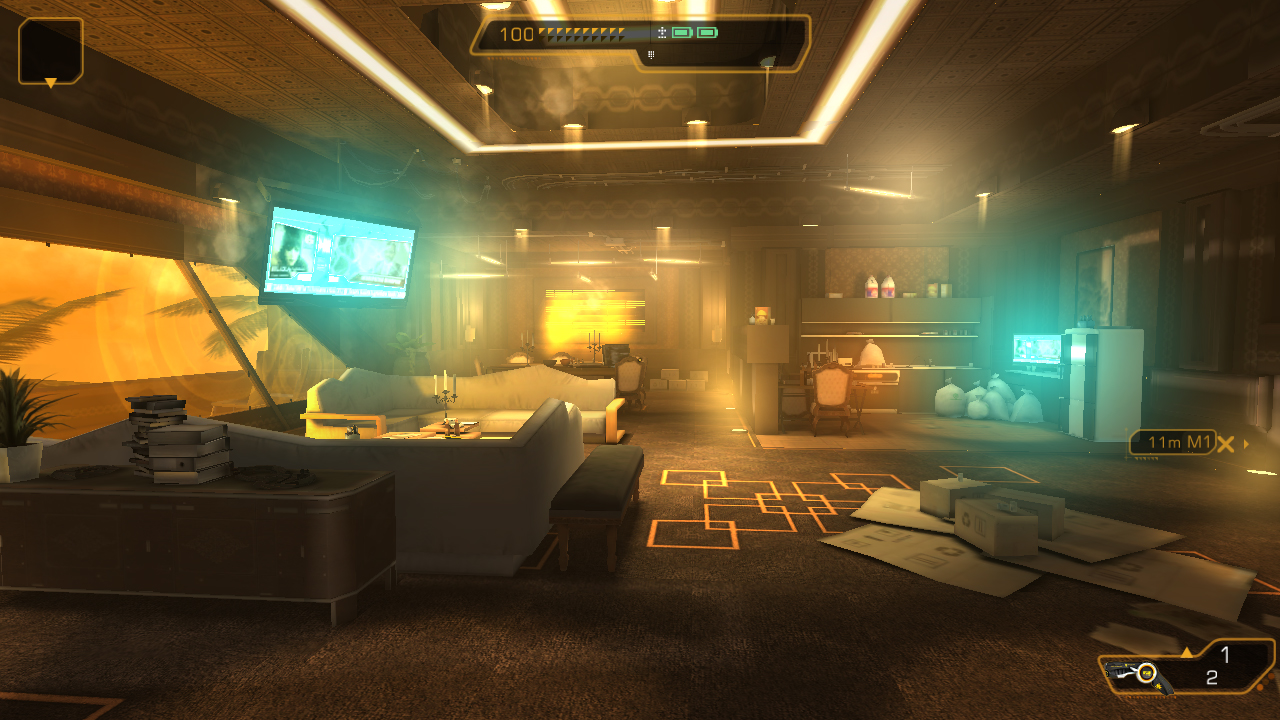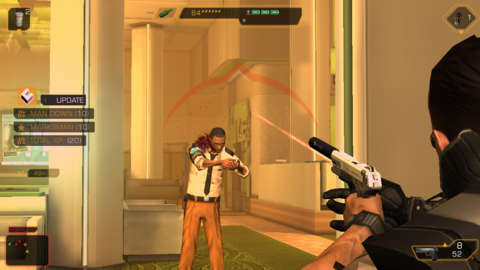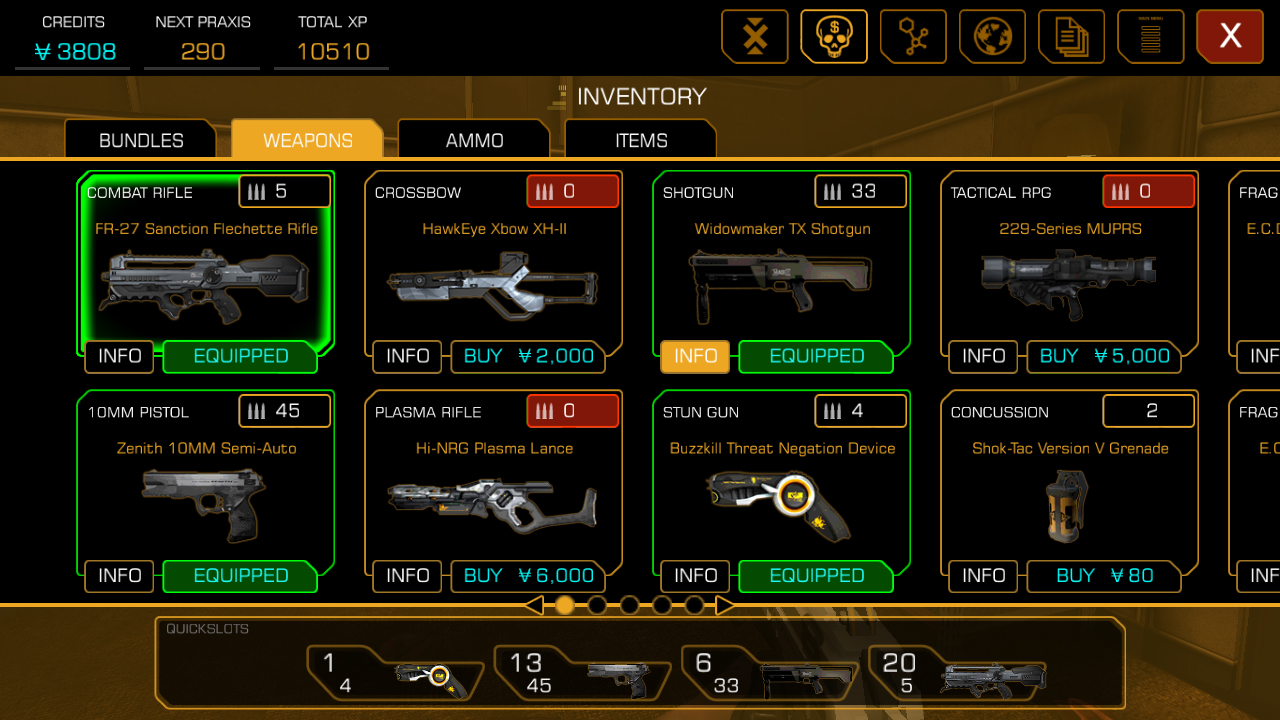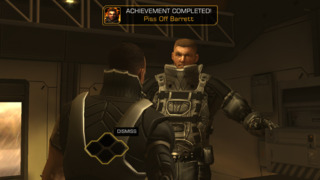Deus Ex: The Fall is a prequel to Deus Ex: Human Revolution, as well as a sequel to Deus Ex: Icarus Effect--a tie-in novel that itself was a prequel (though further back in the chronology) to Human Revolution. Still with me? You don't need to have read Icarus Effect to understand The Fall, but regardless, this identity is not good for the game. Broader themes common to the Deus Ex series can be found here: choice and consequence, moral ambiguity, and a dark and gritty cyberpunk ambience. The Fall gets those basics right, but the game fails to craft a unique identity for itself because it's being crushed between two disparate sources of narrative canon.
New protagonist Ben Saxon is a close approximation of Human Revolution's Adam Jensen--the same augmentations, a similar dark past, and identical futuristic sunglasses. Like Jensen, Saxon is on a quest to unravel a conspiracy. Because of this, he's just not interesting as a standalone character. Instead, fans of the series will be more interested in the appearance of Human Revolution's boss characters as brief sidekicks in Saxon's journey. These bosses were underdeveloped in Human Revolution, so the chance to see more of their backstory helps to fill in some of that game's blanks. As a result, The Fall's own story never has a chance to come into its own as it's too strongly tied to Human Revolution. The narrative is further hurt by the fact that The Fall ends on a "To be continued" screen, and neither Eidos Montreal nor developer nFusion has made any mention of whether they intend to continue the story.
Just as nFusion has attempted to recreate Human Revolution's key plot beats, so too has the developer attempted to translate as much of Human Revolution's mechanics as possible. You explore an urban hub--just one, in this case: Panama City--in first person, have conversations with non-player characters, infiltrate gang hideouts and secure complexes with a combination of stealth and combat, and upgrade your weapons and mechanical augmentations to expand the gameplay approaches open to you.
So why does playing The Fall feel like an appetiser to Human Revolution's main course? That would be because this PC version of The Fall is a port of an iPad game originally released last year. As you can imagine, it would be rather difficult to cram a full-fledged Deus Ex experience into a tablet, but damned if nFusion didn't try. The Fall is a game that so rigorously adheres to the mechanics and aesthetic defined by Human Revolution that the mere fact that it even ran on an iPad is impressive.
On the PC, these tablet origins mean we get the worst of both worlds--a game that feels like a clunky port, and one that still suffers from the technical restrictions of a tablet.
Unfortunately, on the PC, these tablet origins mean we get the worst of both worlds--a game that feels like a clunky port, and one that still suffers from the technical restrictions of a tablet even though those restrictions don't exist on PC hardware. The Fall is a game that captures the look and feel of Human Revolution but is so unpolished and so massively reduced in scope that it's hard to immerse yourself in the world.

The controls are another culprit here; they are clunky and unresponsive in ways that a keyboard and mouse never should be. Menu buttons routinely fail to respond to repeated mouse clicks. The HUD has not been sufficiently converted from its original tablet-friendly design into an interface that works with keyboard hotkeys. Scrolling through text and inventory screens is far from smooth. You do these things so regularly that such minor niggles result in great aggravation over The Fall's eight-hour play time--eight hours in which the game's single hub location artificially inflates play time by forcing you to travel back and forth through tiny areas sectioned off by frequent load zones.

This lack of polish extends from the interface to basic gameplay functions. Moving in and out of cover is clunky. Cover angles are inconsistent, with enemy bullets reaching around corners to hit you when they should impact cover instead. At one point, I entered cover and simply fell through the world geometry and died. The inability to jump at will makes removes the joy of vertical exploration, and reduces the scope of cover-based shootouts to what feels like a series of corridors rather than varied features of an environment.
But the most disappointing thing about The Fall is the complete lack of the extra layer of systemic possibilities that have appeared in every prior Deus Ex game. You can't pick up and stack boxes to create your own routes through areas. Bodies actually dissolve into nothingness after a few seconds, completely removing the need to hide them to maintain a stealth approach. This discourages sneaking by removing an extra layer of cautious play, and making a guns-blazing play style the path of least resistance. Heavy objects can't be picked up and thrown at enemies or used to block incoming fire--interacting with them simply makes them slide out of the way in a canned animation. The lack of these systems results in a disappointingly restrictive and stripped-down approximation of a Deus Ex game.

The store uncomfortably removes much of the planning and forethought required for a Deus Ex game.
The store in The Fall is not a vendor character, but a menu screen that can be accessed at any time, where purchases are instantly transferred to your inventory, without logical explanation. It's a functional holdover from the iPad version's design for real-money microtransactions. Though you can't spend real money in the PC port--in-game credits are used for store purchases instead--the store uncomfortably removes some of the planning and forethought required for a Deus Ex game. A climactic final encounter pitted me against an enemy armoured robot; because I had no weapons to take it down, I browsed the store, purchased a rocket launcher with three rockets, and blew the robot up a few seconds later. It felt cheap, lazy, and thoroughly unsatisfying. Because exploration has been simplified, finding credits lying around the world is simple enough that money is plentiful. The store is optional, but, since there are no traditional vendors to act as an alternative, you will feel significantly underequipped if you avoid it.

This store is the perfect example of the many problems that plague The Fall. This PC port fails to take advantage of the PC's increased technical power and greater control fidelity to adequately smooth over the game's prior tablet limitations. The story feels like it's attempting to fill in some blanks regarding Human Revolution's underdeveloped boss characters, but the game ends well before it has the chance to do so. At least nFusion had the mercy to not include any boss fights.